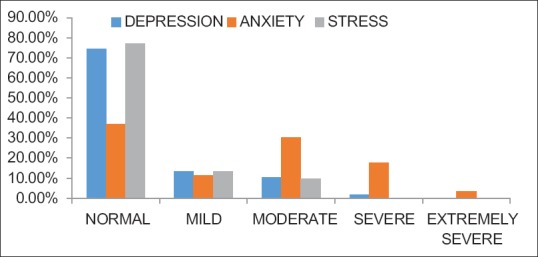Sir,
Pregnancy is supposed to be a time of emotional well-being in a woman's life, but for many women, this is a time of confusion, fear, sadness, anxiety, stress, and even depression. Mental health, in spite of being an important component of reproductive health, is often neglected. Moreover, in the absence of systematic screening, most antenatal mental disorders are not detected.
According to the American College of Obstetricians and Gynecologists, between 14% and 23% of women will struggle with some symptoms of depression during pregnancy.[1] Depression in pregnancy may diminish one's capacity for self-care, precipitating inadequate nutrition, drug or alcohol abuse, and poor antenatal clinic attendance, all of which may compromise a woman's physical and mental health, may reduce optimal fetal monitoring, and might restrict the growth and development of the fetus. Performing antenatal screening is justified and seems reasonable since most postnatal depressive disorders begin during or before pregnancy. Anxiety during pregnancy has been found to be associated with depression as well as adverse pregnancy outcomes. Various studies have shown a link between antenatal maternal stress and cognitive, behavioral, and emotional problem in a child.
An in-depth community-based query has to be made during the antenatal period as most of the past studies have been hospital-based and postnatal centric. The importance of mental health in pregnancy can be emphasized by the fact that even the best obstetric care cannot give a desirable outcome of the pregnancy if the mental health issues of the expectant mother are not addressed at the right time and in the right manner.
To generate local evidence to fill up the knowledge gap about the mental health problems faced by the antenatal females and to assess the prevalence of depression, anxiety, and stress in antenatal females, a cross-sectional community-based descriptive enquiry was conducted from January to October 2014 in Ghazipur, an urbanized village in East Delhi which is the field practice area of our institute. One hundred and sixty-five antenatal women who gave consent to participate in the study and residing in the area for 6 months or more were included in the study. The study participants who needed immediate medical attention and/or participant with chronic mental illness were not included in the study. The tool used for the study included the depression, anxiety, stress scale.
The prevalence of depression, anxiety, and stress was found to be 25.5%, 63%, and 23%, respectively. Figure 1 shows the distribution of depression, anxiety, and stress based on severity.
Figure 1.

Severity of depression, anxiety, and stress among pregnant females (n = 165)
The increased vulnerability for mental illness in pregnancy can be explained by the “Biopsychosocial Model,”[2] which integrates the biological, psychological, and social factors to explain the occurrence of mental illness. Pregnant females have increased biological vulnerability due to the hormonal maladjustment, psychological vulnerability due to apprehension for new life of motherhood, and social vulnerability due to the added demands of family support and care during this critical phase of her life. More community-based studies need to be done to increase the database of similar bigger epidemiological studies to be conducted in different social and cultural settings in India. Our study provided a quantitative descriptive enquiry, but some sensitive issues can be picked up only by qualitative study such as in-depth interviews or focus group discussion. There is now a need to move toward quality comprehensive antenatal services. The findings of our study indicate the need to incorporate mental health components in RCH (Reproductive & Child health) program. At the present junction, universal screening may not be a suitable strategy, but surely, it is a desirable and achievable goal in the future. Longitudinal prospective research is needed to establish the temporality of the onset of depression, anxiety, and stress in pregnancy. A control group of nonpregnant women with a similar sociodemographic profile may be a good estimate of the actual burden of mental health morbidities in pregnancy. Repeated probing on several occasions can build up the rapport and gain the confidence of the victim, so antenatal care visits are an ideal option as there are multiple chances of contact with the healthcare delivery system. Our study provided scoping bit in the base of these hitherto less explored and less examined and underappreciated issues related to pregnancies, on which further studies can be planned on a larger constructive framework and better-resourced methodologies.
Financial support and sponsorship
Nil.
Conflicts of interest
There are no conflicts of interest.
REFERENCES
- 1. [Last accessed on 2014 May 25]. Available from: http://www.americanpregnancy.org/pregnancy.health/depression.during.pregnancy/
- 2.Ghaemi SN. Paradigms of psychiatry: Eclecticism and its discontents. Curr Opin Psychiatry. 2006;19:619–24. doi: 10.1097/01.yco.0000245751.98749.52. [DOI] [PubMed] [Google Scholar]


